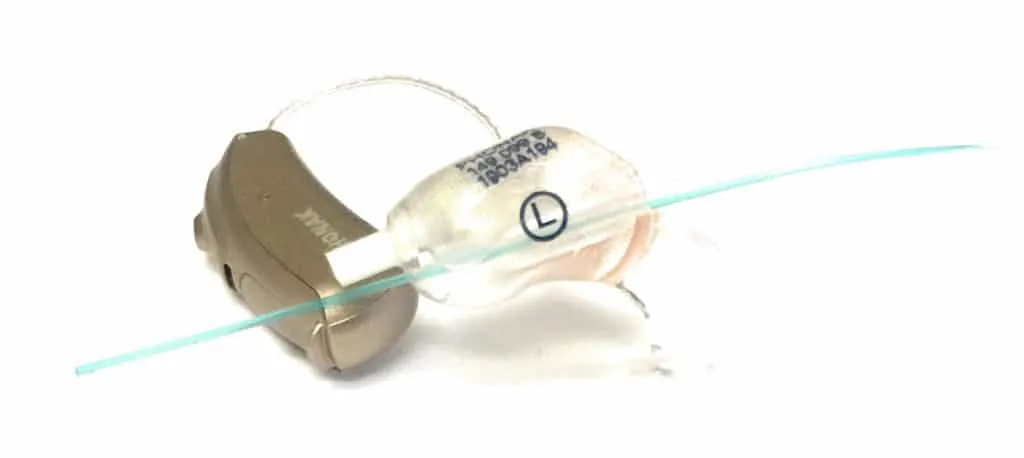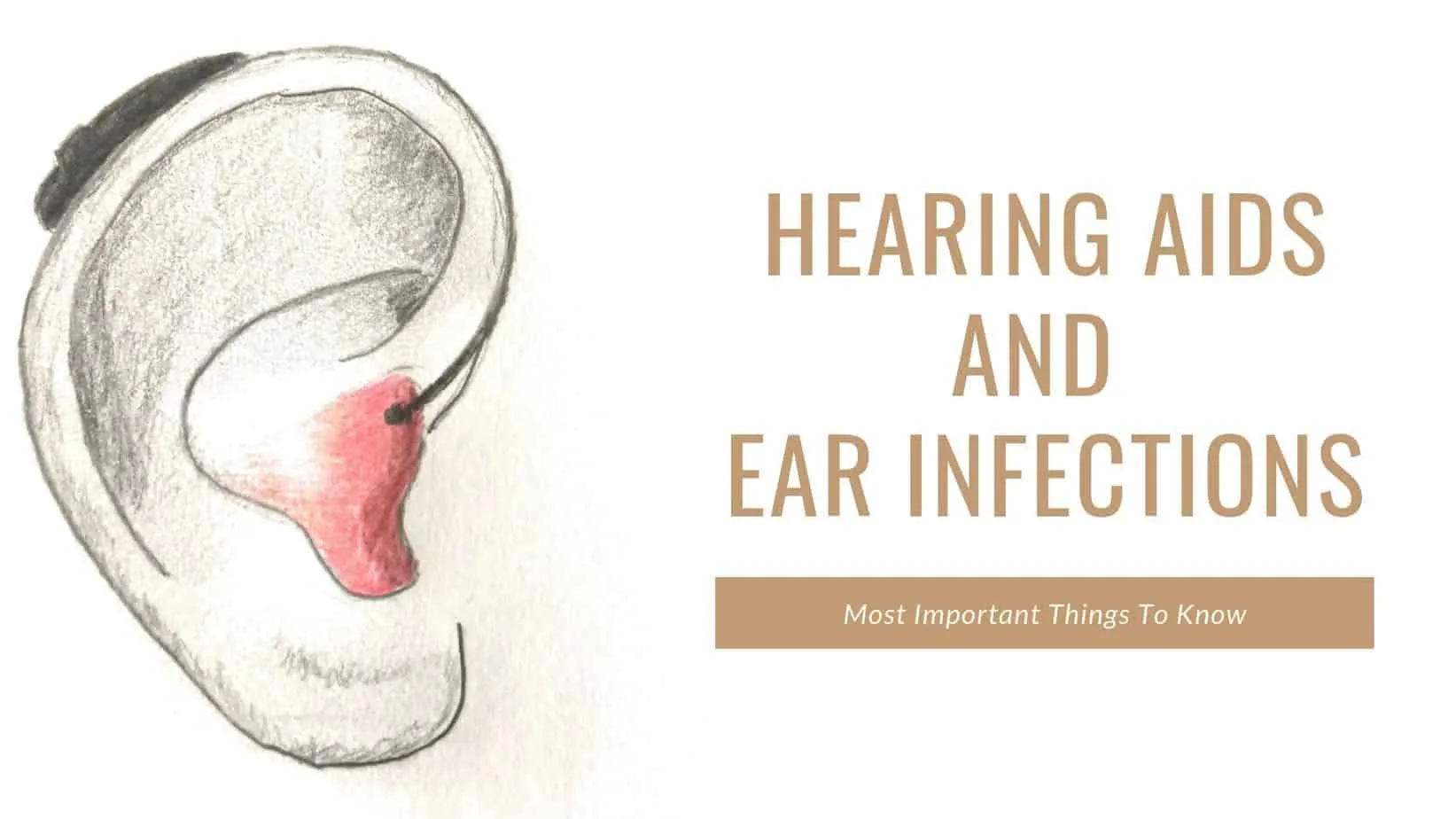As an audiologist with 11 years of experience, I have seen many patients who are frustrated and in pain due to ear infections. For those with hearing loss, an ear infection can be especially debilitating and even more inconvenient. A common question I receive is whether their hearing aids may have contributed to their infection.
So can an ear infection be caused by hearing aids? A clean and properly worn hearing aid should not cause an infection however if the hearing aid is not cleaned daily it could introduce bacteria into the ear canal that could result in an ear infection (otitis externa).
It is important to note that a well-maintained and properly worn hearing aid should not cause an infection. However, if the hearing aid is not cleaned regularly, it could potentially introduce bacteria into the ear canal, leading to otitis externa (an ear infection).
If you believe you have an ear infection and are wondering if your hearing aids may have played a role, this article will examine that possibility and provide guidance on what steps to take next.
How A Hearing Aid Could Cause An Ear Infection
As an audiologist, I strongly advise my patients to clean their hearing aids on a daily basis to prevent any potential issues. While daily cleaning is the ideal scenario, in reality, it may not always be possible. In such cases, the accumulation of wax or debris in the hearing aid can cause it to stop functioning properly, although it is rare for it to directly lead to an ear infection. Nevertheless, it is important to be diligent in maintaining the cleanliness of hearing aids to minimize the risk of any issues arising.
Lubricate Improperly
For severe to profound hearing aid users, the earmold may fit tightly in their ear. Some individuals choose to lubricate the earmold with a product specifically designed for this purpose, such as Otoease. However, some patients resort to a more convenient method, which is lubricating the earmold with their saliva. This practice is unsanitary and can introduce bacteria into the ear canal, resulting in an infection. I strongly advise against licking your hearing aid or placing it in your mouth for any reason. Instead, use a water-based lubricant, such as Otoease, or any other personal lubricant readily available.
DO NOT LICK your hearing aid or put it into your mouth for any reason. Your saliva is a great lubricator but it also introduces bacteria into your ear canal which may result in an infection.
Bacteria On The Hearing Aid
As we go through life bacteria will build up on things. This is why handwashing is so important. Anything that is on your hand is now on your hearing aid when you inserted it into your ear canal. So it is a good idea to get clean hands before putting in your hearing aids.
To be sure your hearing aid is bacteria-free you could wipe your hearing aid off with an alcohol pad when you clean the hearing aids or you can use audiology choice wipes. Both will work great.

Another option is a UV hearing aid dryer. I reviewed a couple of them in this article, these devices will both dry out the hearing aid and sterilize it each night.
Clogged Vent
Your ear canal needs proper ventilation in it to remain healthy. A dirty earmold or a dirty dome prevents air ventilation from occurring which may create an unhealthy ear canal.
If your hearing aid has a custom-fit earmold attached to it, make sure the vent (the hole that goes all the way through the hearing aid is clean.)
You can do this by sticking something all the way through the vent to push out debris that is clogging the vent. When you got your hearing aids they should have had tools to do this. If you no longer have them you can use a pipe cleaner if you have a large vent. If the vent is too small to fit a pipe cleaner. I recommend a fishing line type of tool to push through the vent.

Or if you want to clean your hearing aids like a true professional, you can purchase a Jodi-vac which will suction out any wax from inside the hearing aid. But this is probably not needed for most people.
Related Article Everything You Need To Know About Getting Custom Earplugs
Don’t Wear Hearing Aids If You Have A Cut or Sore In Your Ear
Anytime you have a skin abrasion it is best not to wear your hearing aids for a day or two until the sore heals. This would include if your ear is swollen or currently has an infection. Now I know some individuals that this simply isn’t an option because they need their hearing aids to function at work or to communicate with their loved ones.
If you can get by without wearing the hearing aid it would be best. If you absolutely must wear the hearing aid, make sure it is completely clean before you put it in the ear, and remove the hearing aid at any time that it isn’t absolutely necessary.
What If Your Hearing Aid Is Hurting Your Ear
Pain in the ear caused by a poorly fitting hearing aid can be a frustrating experience. To resolve this issue, it’s recommended to speak with your audiologist for their expert opinion. Some solutions include switching to a smaller or larger dome, grinding down the pressure point on the earmold or hearing aid, getting a new earmold impression, lengthening the receiver wire or tube, or switching to a different type of earmold material if you have an allergy. Here are some tips:
- If your hearing aid has a dome on it, change it to either a smaller or larger dome.
- If you have an earmold, your audiologist can grind down the earmold or hearing aid at the pressure point so that it will no longer cause a sore.
- Remake the entire earmold/hearing aid by taking a new earmold impression and sending it back to the manufacturer for a new one.
- Lengthen the receiver wire or tube on the hearing aid so that it is not being pulled up by the over-the-ear portion of your hearing aid.
- If you are allergic to the earmold material, switch to a different type of mold.
Related Questions
How often should hearing aid tubing, domes, and wax traps be changed? Tubing, domes, and wax traps should be changed as often as needed. But generally, wax traps get changed monthly, tubing every 3 months, and domes every 3 months.
Will wearing hearing aids cause more hearing loss? Properly fit hearing aids will not cause more hearing loss as there are limits to how loud they can get. Check out our hearing aid recommendations.


